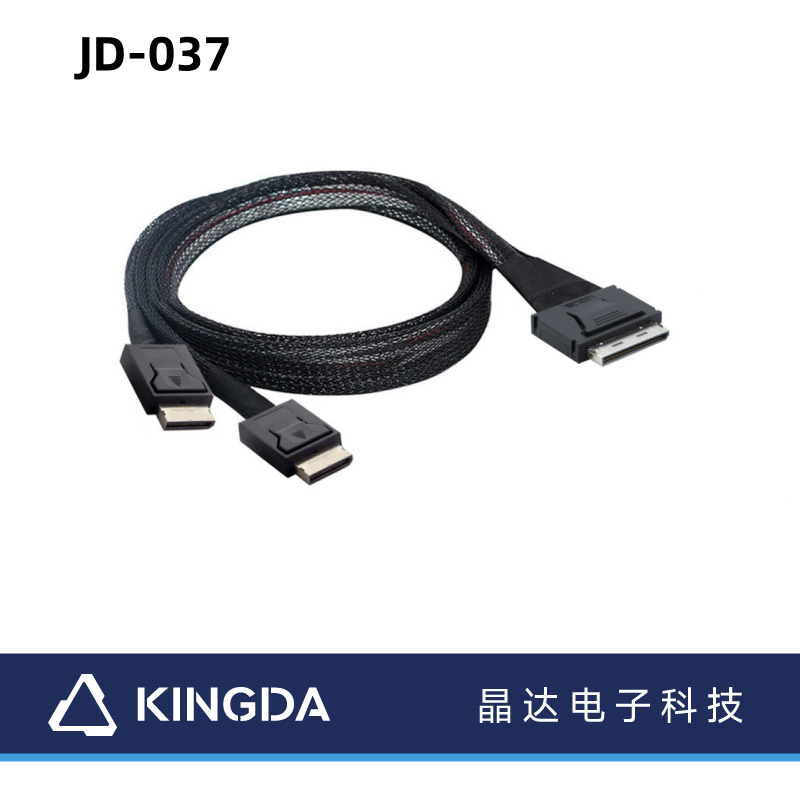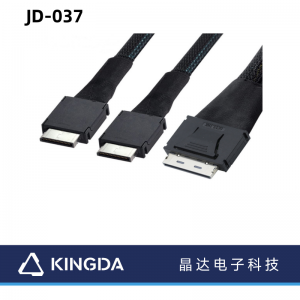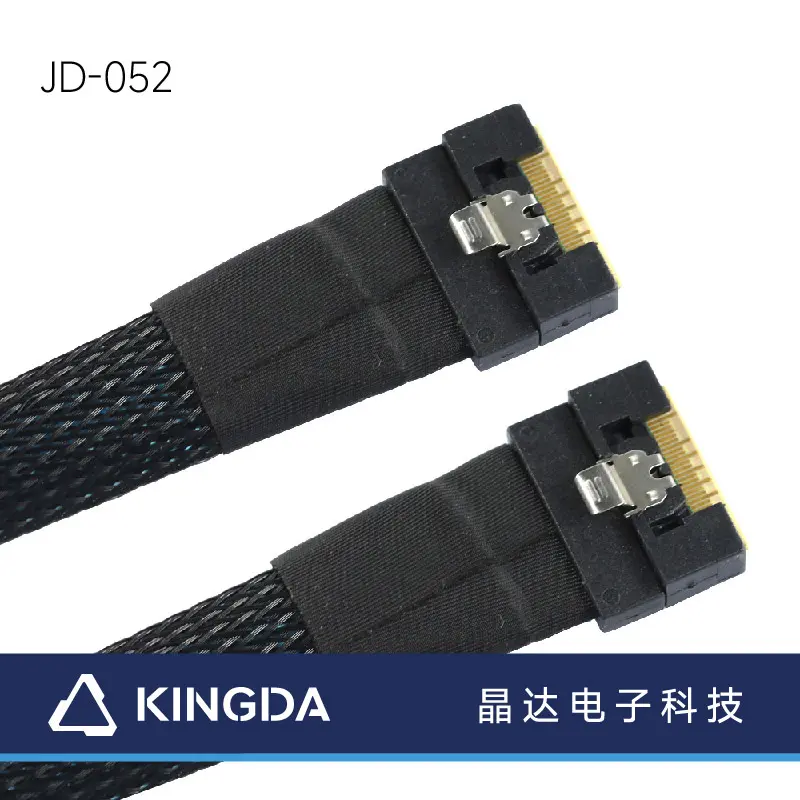PCIE Oculink SAS SFF – 8611 8I to Two SFF 8611 4I Server Data Cable
Applications:
The MINI SAS cables are widely used in computer,data transmission and server device.
【INTERFACE】
- PCIE Oculink SAS SFF - 8611 8I Interface: Oculink is a small PCIE connector standard, and its full name is Optical Copper Link. It follows the pure PCIe channel and supports multiple protocols such as PCIe 3.0 or PCIe 4.0. "8I" in SFF - 8611 8I indicates 8-channel (8 lanes) input and output, has a relatively high bandwidth and data transmission capability, and can achieve high-speed data transmission. This interface is usually used in scenarios such as servers and storage devices that have high requirements for data transmission speed.
- Two SFF 8611 4I Interfaces: SFF 8611 is a miniaturized Serial SCSI (Small Computer System Interface) interface standard, and "4I" indicates 4-channel input and output. Here are two SFF 8611 4I interfaces, meaning that this cable can split an 8-channel signal source into two 4-channel outputs to be connected to different devices or storage modules.
Product feature:
High-Speed Data Transmission Capacity:
Based on PCIE and SAS technologies, this cable supports high-speed data transmission. For example, under the PCIE 3.0 protocol, its theoretical bandwidth is relatively high, up to 8 Gbps per channel, and the total bandwidth of 8 channels can reach 32 Gbps; under the PCIE 4.0 protocol, the bandwidth per channel is increased to 16 Gbps, and the total bandwidth of 8 channels can reach 64 Gbps, which can meet the server's requirements for rapid transmission of large amounts of data.
Signal Distribution and Expansion Function:
One end of this cable is an 8I interface, and the other end is two 4I interfaces, which can realize the division of an 8-channel signal source into two 4-channel outputs. This design can conveniently connect multiple devices, realize data distribution and transmission inside the server, provide convenience for the storage expansion and device connection of the server, and increase the scalability of the server.
Product Detail Specifications

Cable Length 0.5M /0.8M/1M
Color Black
Connector Style Straight
Product Weight
Wire Gauge 28/30 AWG
Wire Diameter
Packaging Information
PackageQuantity 1Shipping
(Package)
Weight
Maximum Digital Resolutions
Product Detail Specifications
Warranty Information
Part number JD-DC37
Warranty 1 Year
Hardware
Gender SFF - 8611 8I to Two SFF 8611 4I
Cable Jacket Type HDPE/PP
Cable Shield Type Al foil
Connector Plating Gold plated
Connector(s)
Connector A SFF 8611
Connector B SFF 8611
PCIE Oculink SAS SFF - 8611 8I to Two SFF 8611 4I Cable
Gold Plated
Color Black

Specifications
1.PCIE Oculink SAS SFF - 8611 8I to Two SFF 8611 4I Cable
2. Gold plated connectors
3. Conductor: TC/BC (bare copper),
4. Gauge: 28/30AWG
5. Jacket: Nylon or Tube
6. Length: 0.5m/ 0.8m or others. (optional)
7. All materials with RoHS complaint
| Electrical | |
| Quality Control system | Operation according to regulation & rules in ISO9001 |
| Voltage | DC300V |
| Insulation Resistance | 2M min |
| Contact Resistance | 3 ohm max |
| Working Temperature | -25C—80C |
| Data transfer rate |
What are the features of the SAS cables and the SAS cables
SAS cable is the storage field of the disk media is the most critical device, all data and information should be stored on the disk media. The read speed of the data is determined by the connection interface of the disk media. In the past, we have always stored our data through SCSI or SATA interfaces and hard drives. It is because of the rapid development of SATA technology and various advantages that more people will consider whether there is a way to combine both SATA and SCSI, so that the advantages of both can be played at the same time. In this case, the SAS has emerged. Networked storage devices can be roughly divided into three major categories, namely, high-end middle-end and near-end (Near-Line). High-end storage devices are mainly Fibre channel. Due to the fast transmission speed of Fibre channel, most high-end storage optical fiber devices are applied to the large-capacity real-time storage of task-level key data. The mid-range storage device is mainly SCSI devices, and it also has a long history, being used in the mass storage of commercial-level critical data. Abbreviated as (SATA), it is applied to mass storage of non-critical data and is intended to replace previous data backup using tape. The best advantage of Fibre Channel storage devices is fast transmission, but it has a high price and is relatively difficult to maintain; SCSI devices have relatively fast access and medium price, but it is slightly less extended, each SCSI interface card connects up to 15 (single channel) or 30 (dual-channel) devices. SATA is a rapidly developing technology in recent years. Its biggest advantage is that it is cheap, and the speed is not much slower than the SCSI interface. With the development of technology, SATA’s data reading speed is approaching and surpassing the SCSI interface. In addition, as SATA’s hard disk is getting cheaper and more expensive, it can gradually be used for data backup. So the traditional enterprise storage because considering the performance and stability, with SCSI hard disk and fiber optic channel as the main storage platform, SATA is mostly used for non-critical data or desktop personal computer, but with the rise of SATA technology and SATA equipment mature, this mode is being changed, more and more people began to pay attention to SATA this serial data storage connection way.

















